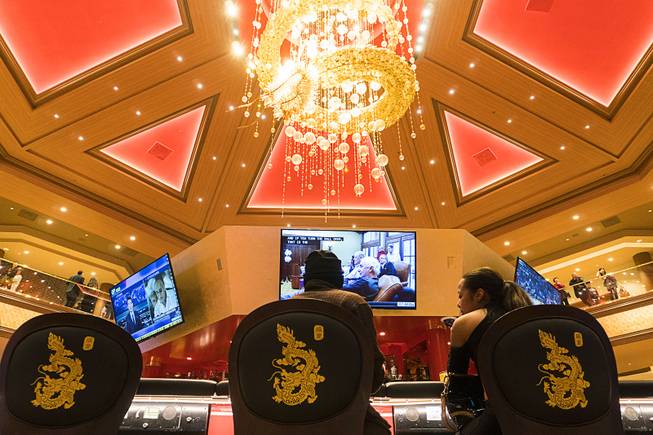
Guests are seen at the bar at Lucky Dragon during the boutique resort’s grand opening celebration, Saturday, Dec. 3, 2016.
Wednesday, March 15, 2017 | 2 a.m.
Related Coverage
It’s been almost four months since Las Vegas’ first expressly Asian casino opened its doors, with a marketing strategy as unique as the glass dragon hanging from the ceiling above the casino’s center bar.
Has Lucky Dragon’s strategy worked?
Yes, other casinos market directly to Asian customers. Some properties have even adjusted the design of their buildings and added restaurants or attractions specifically for the market. The Bellagio’s frequent use of Asian motifs in its conservatory and the success of the Ping Pang Pong restaurant at the Gold Coast are obvious examples.
But Lucky Dragon was designed from the ground up to attract Asian gamblers — from that huge glass dragon to the feng shui design throughout the building to the Chinese-first, English-second bathroom signs.
Testifying before the Gaming Control Board in October, Lucky Dragon general manager Matthew Harkness said the plan was to market to domestic Asian customers in Las Vegas and California and also in the Pacific Northwest.
The best way to know if that was a smart move would be to look at the casino’s balance sheet. But the Lucky Dragon is a privately held property, and is under no obligation to release financial numbers.
Another way might be to look at the changes being made now that it’s been open for a few months because resorts often tweak their offerings after getting a little real-world experience with their customers.
In fact, during a recent conference call with investors, gaming magnate Steve Wynn said he deliberately left space in one of his Macau resorts undeveloped to accommodate changes he knew he’d have to make after the place opened.
Indeed, with a few months of operation under its belt, Lucky Dragon is making changes, all of which seem to support its Asian strategy.
The casino is building an Asian noodle bar and moving the Pearl Ocean restaurant (now on the second floor) into the space on the first floor that currently houses an Asian-themed food court.
Once Pearl Ocean is moved, its space on the second floor will be converted to another Macau-themed VIP gaming lounge. The casino has also implemented a rolling-chip VIP customer reward program, a method for rewarding VIP play that’s popular in Macau but hasn’t caught on in Las Vegas.
VIP programs often give high-rollers a certain percentage, or commission of their overall betting back to them, regardless of whether they win or lose. With a rolling-chip program they’re given that commission in the form of chips that can only be played, not cashed in for money.
Steve Cyr, longtime Las Vegas casino VIP host and author of a book about VIP gaming titled “Whale Hunt in the Desert,” said few Vegas casinos have adopted the rolling-chip approach.
“There are a couple of places doing it,” Cyr said. “For example, the Rio is doing it, but on a very limited basis. They (Lucky Dragon) are the leader.”
Jordan Seager, Lucky Dragon’s vice president of marketing, wouldn’t talk specific numbers when it comes to revenues or the exact demographic breakdown of the customers he’s seeing at Lucky Dragon.
But he did say marketing to Asians on the West Coast has worked. “Northern and Southern California are our top areas, for sure,” Seager said. “And Vancouver’s been very strong.”
Although Lucky Dragon does serve its share of non-Asians (especially those who enjoy Asian food), Seager said that when he walks the property “the clients I see, the majority of them are of Asian descent. Whether that means first- or second-generation I couldn’t tell you.”
The casino does attempt to cater to people from a wide variety of Asian cultures. When customers sign up for the casino loyalty program, they’re asked if they prefer Tagalog, Korean, Vietnamese or other Asian languages for communications.
“Chinese is by far the dominant language or demographic of our customers,” he said.
If there has been one surprise, it’s been how successful the VIP market has been for the casino, Seager said.
“We have had a much stronger VIP segment than what we anticipated and that affects obviously our overall business,” he said. “That’s why we have expanded the VIP segment (of the casino floor) specifically because our current VIP business has a need for the additional area. If we had anticipated that six months prior we might have changed that from the beginning but that’s not a bad thing to have happen.”

Join the Discussion:
Check this out for a full explanation of our conversion to the LiveFyre commenting system and instructions on how to sign up for an account.
Full comments policy